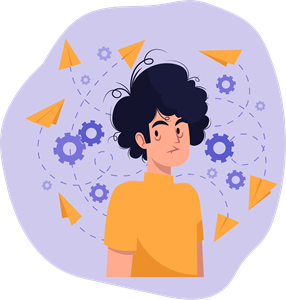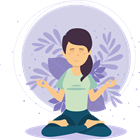How ADHD affects the Brain The real effects of ADHD...
Read MoreOCD
All you need to know about OCD
Find out our expert answers to the top questions asked on Google regarding OCD
Snealth will answer all of it as openly and clearly as possible
Although all the causes of ADHD are unknown, current research shows that ADHD tends to run in families and that genetics do play a role
With OCD, you have thoughts or compulsions that upset you and cause distress. You might try to ignore them or push them out of your mind, but this is generally difficult or impossible. Even if you do stop thinking about them for a while, they usually keep coming back. If you live with OCD, you might have a range of different symptoms. Your symptoms might come mostly from one group or more than one group.
- Cleaning and contamination
- Symmetry and ordering
- Forbidden thoughts
- Hoarding
If you think you or a loved one have OCD symptoms, talk to a mental healthcare provider. They can diagnose OCD and work with you to find the most effective type of treatment. A mental healthcare provider will ask you about the types of symptoms you experience, whether they cause distress, and how much time they take up each day. Diagnosis of OCD generally requires that symptoms affect your daily function and consume at least an hour of your day. Your mental healthcare provider will likely note the group of symptoms you experience, since not all OCD treatments have the same benefits for all symptoms. They’ll also explore if you have tics or other behavioral symptoms and discuss the level of insight or beliefs you have surrounding the obsessions and compulsions you experience. In other words, they’ll want to know whether you feel OCD-related beliefs are likely to happen, might happen, or definitely won’t happen. Your provider will also ask how long you’ve had symptoms. Results of a 2009 study suggest OCD symptoms that begin in childhood are often more severe.
MHPs generally consider therapy & medication, or a combination of the two, to have the most benefit in the treatment of OCD.
Exposure and response prevention (ERP), a type of cognitive behavioral therapy (CBT), is generally the recommended approach. This type of treatment gradually exposes you to subjects of your obsessions or things that cause compulsions. In the safe space of therapy, you can learn how to deal with the discomfort you experience without acting out compulsions.
You’ll probably also spend some time practicing these skills at home or in other environments outside of therapy. If you have severe OCD symptoms, or if your symptoms don’t seem to respond to therapy alone, your mental healthcare provider may recommend talking to a psychiatrist about medication. You might take medication just for a short time while you learn how to cope with symptoms in therapy. Drugs that can have benefit for OCD symptoms include antidepressants such as Selective Serotonin Re-uptake Inhibitors (SSRIs) or anti-psychotics.
The most helpful treatment for OCD can sometimes depend on your symptoms. One 2008 review looked at existing studies on how OCD symptoms respond to different types of treatment. Researchers found evidence to suggest some symptom sub-types, such as cleaning and contamination symptoms, may not respond as well to SSRIs. The same study also suggests ERP therapy may not as effective for obsessive thoughts. Different CBT approaches, such as mindfulness-based CBT, may have more benefit.
However, research results can vary. Two people won’t always respond to treatment in the same way, even if they have very similar symptoms. Deep brain stimulation is a new type of treatment that may help improve symptoms of OCD in people who don’t see improvement with other treatments.
This treatment hasn’t yet been fully researched, however. It may pose some health risks. If you’re interested in deep brain stimulation, your primary care doctor or mental healthcare provider may be able to provide more information.
Maybe not. As of now, there isn’t any sureshot way to prevent or to cure ADHD. But good treatment and medication can help manage the symptoms
Free Mental Health Tests & Quizzes
Anxiety Test
Social Anxiety Test
ADHD Test
Addiction Test
Bipolar Test
Borderline Test
PTSD Test
Insomnia Test
Job Stress Test
Exam Stress Test
Loneliness Test
Marital Issues Test
Panic Disorder Test
OCD Test
Schizophrenia Test
Autism Test
Quick Notes on OCD
What is OCD?
An obsession is an unwanted intrusive thought, doubt, image or urge that repeatedly enters a person’s mind. Obsessions are acknowledged as originating in the person’s mind and as being unreasonable or excessive.
- Fear of being contaminated by germs or contaminating others
- Fear of losing control and harming oneself or others
- Intrusive sexually explicit or violent thoughts and images
- Excessive focus on religious or moral ideas
- Order and symmetry: the idea that everything must line up “just right”.
A compulsion is an irresistible persistent impulse to perform an act. The state of being forced to do something.
- Excessive double-checking of things, such as locks, appliances, and switches
- Repeatedly checking in on loved ones to make sure they’re safe
- Counting, tapping, repeating certain words, or doing other senseless things to reduce anxiety
- Spending a lot of time washing or cleaning
- Praying excessively or engaging in rituals triggered by religious fear
The OCD Cycle
To make one feel safer and less anxious, when in fact they do the exact opposite, they make the person feel unsafe and scared.
Dominant Emotions in OCD :
- Anxiety
- Disgust
- Shame & Guilt
- Anger, Frustration & Discomfort
Across the Ages
How prevalent is OCD across age groups

No Data Found
Parenting ADHD
Parenting & ADHD
Read MoreADHD and Relationships
ADHD and Relationships Mental Health Issues | ADHD | by...
Read More
How ADHD affects the Brain The real effects of ADHD and its diagnosis by Aastha Singh Signs of child ADHD…

ADHD and Relationships Mental Health Issues | ADHD | by Nidhi Panchal Relationships are a very important and inevitable part…
Join Snealth's OCD Community
About Us
Mental Healthcare is our top priority. The pandemic has affected the mental health of a lot of us, and snealth aims to revive each of us with the help of its technologies. We are groups of helping individuals who want to get you to boost your mental health. We help you get comfortable with yourself, so that you can lead a content life.
Snealth provides you with care, helps you get to a state of mind where you can appreciate life and living. We aim at removing the stigma around mental health and make society more inclusive, accepting and judgement free.






